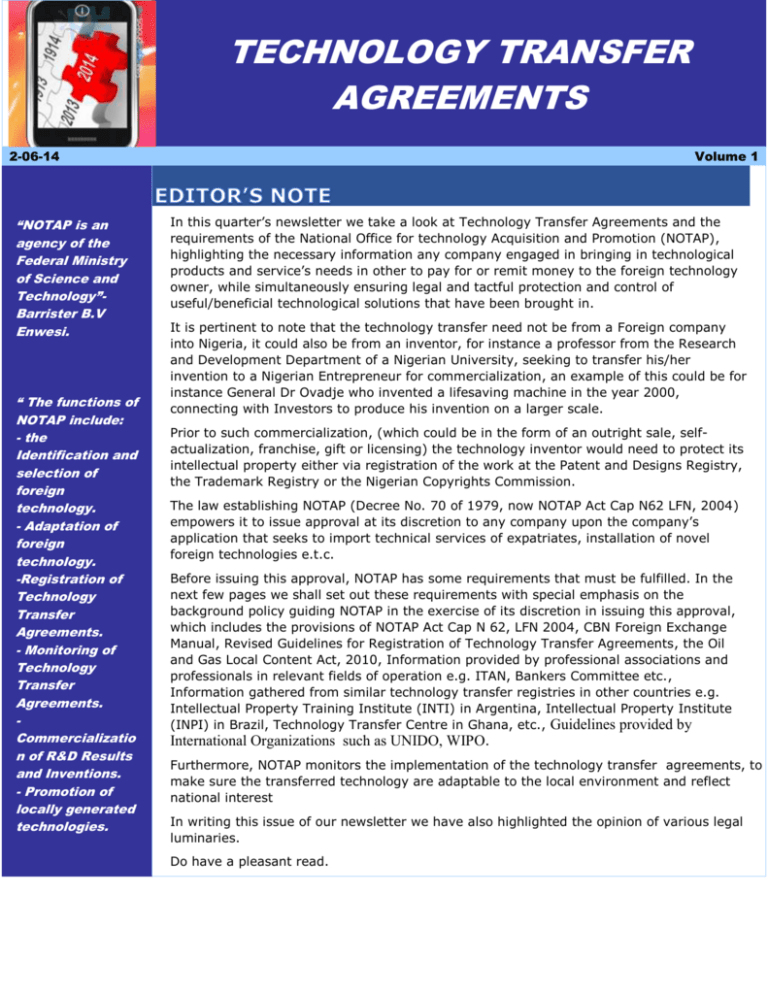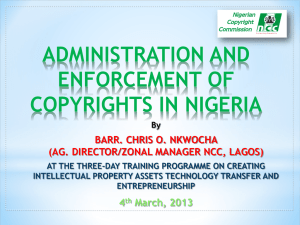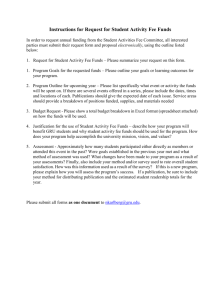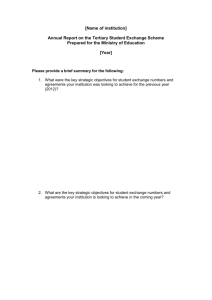
TECHNOLOGY TRANSFER
AGREEMENTS
2-06-14
“NOTAP is an
agency of the
Federal Ministry
of Science and
Technology”Barrister B.V
Enwesi.
“ The functions of
NOTAP include:
- the
Identification and
selection of
foreign
technology.
- Adaptation of
foreign
technology.
-Registration of
Technology
Transfer
Agreements.
- Monitoring of
Technology
Transfer
Agreements.
Commercializatio
n of R&D Results
and Inventions.
- Promotion of
locally generated
technologies.
Volume 1
In this quarter’s newsletter we take a look at Technology Transfer Agreements and the
requirements of the National Office for technology Acquisition and Promotion (NOTAP),
highlighting the necessary information any company engaged in bringing in technological
products and service’s needs in other to pay for or remit money to the foreign technology
owner, while simultaneously ensuring legal and tactful protection and control of
useful/beneficial technological solutions that have been brought in.
It is pertinent to note that the technology transfer need not be from a Foreign company
into Nigeria, it could also be from an inventor, for instance a professor from the Research
and Development Department of a Nigerian University, seeking to transfer his/her
invention to a Nigerian Entrepreneur for commercialization, an example of this could be for
instance General Dr Ovadje who invented a lifesaving machine in the year 2000,
connecting with Investors to produce his invention on a larger scale.
Prior to such commercialization, (which could be in the form of an outright sale, selfactualization, franchise, gift or licensing) the technology inventor would need to protect its
intellectual property either via registration of the work at the Patent and Designs Registry,
the Trademark Registry or the Nigerian Copyrights Commission.
The law establishing NOTAP (Decree No. 70 of 1979, now NOTAP Act Cap N62 LFN, 2004)
empowers it to issue approval at its discretion to any company upon the company’s
application that seeks to import technical services of expatriates, installation of novel
foreign technologies e.t.c.
Before issuing this approval, NOTAP has some requirements that must be fulfilled. In the
next few pages we shall set out these requirements with special emphasis on the
background policy guiding NOTAP in the exercise of its discretion in issuing this approval,
which includes the provisions of NOTAP Act Cap N 62, LFN 2004, CBN Foreign Exchange
Manual, Revised Guidelines for Registration of Technology Transfer Agreements, the Oil
and Gas Local Content Act, 2010, Information provided by professional associations and
professionals in relevant fields of operation e.g. ITAN, Bankers Committee etc.,
Information gathered from similar technology transfer registries in other countries e.g.
Intellectual Property Training Institute (INTI) in Argentina, Intellectual Property Institute
(INPI) in Brazil, Technology Transfer Centre in Ghana, etc., Guidelines provided by
International Organizations such as UNIDO, WIPO.
Furthermore, NOTAP monitors the implementation of the technology transfer agreements, to
make sure the transferred technology are adaptable to the local environment and reflect
national interest
In writing this issue of our newsletter we have also highlighted the opinion of various legal
luminaries.
Do have a pleasant read.
- Dissemination
of technology
information
- Promoting
awareness on
IPR etc. ”Professor Umar
Bindir
Technology
transfer should
not continue
perpetually, the
Nigerian
employee should
learn totally and
promptly the
transferred
technology and
begin local
innovation /
creation of its
own technology,
this will result in:
Increasing the
nations Gross
Domestic
Product.
Improving the
nations
international
image
Improving the
value of the
national
currency.
Technology Transfers was defined by Professor Umar Bindir the current Director General of
NOTAP as the movement of technology (that is Intellectual Property and Intellectual
Property Rights) from where it is available (source) to where it is needed (destination).
Often times it is the Entrepreneur, who can be defined as the possessor of the skills of
transforming the technology into business solutions on a commercial scale that is the
destination spot.
A technology transfer agreement may be defined as a legally binding document that
contains the terms and conditions under which technical skills, specialized knowledge,
technical know-how and other proprietary rights for the manufacturing of goods and
services are transferred from one individual, enterprise or organization known as the
“licensor” to another person, enterprise or organization (“licensee”) through licensing
and other contractual arrangements that are mutually beneficial to both parties.
Prior to the establishment of NOTAP, there were trade imperfections in the nation’s
technology market, with the developed nations always having the upper hand at the
expense of Nigeria. These include: Tie-in-clauses, Excessive payment terms, Restriction of
markets, Raw materials and Export control e.t.c.
FUNCTIONS OF NOTAP
Subject to section 2(1) of the NOTAP Act, the National Office shall carry out the following
functions:The encouragement of a more efficient process for the identification and selection
of foreign technology;
a) The development of the negotiation skills of Nigerians with a view to ensuring the
acquirement of the best contractual terms and conditions by Nigerian parties
entering into any contract or agreement for the transfer of foreign technology;
b) The provision of a more efficient process for the adaptation of imported technology;
c) The registration of all contracts or agreements having effect in Nigeria on the date
of the coming into force of this Act, and of all contracts and agreements hereafter
entered into, for the transfer of foreign technology to Nigerian parties; and without
prejudice to the generality of the foregoing, every such contract or agreement shall
be so registered if its purpose or intent is, in the opinion of the National Office,
wholly or partially for in or connection with any of the following purposes, that is to
say:
I.
II.
The use of trademarks;
The right to use patented inventions;
III.
The supply of technical expertise in the form of the preparation of plans, diagrams,
operating manuals or any other form of technical assistance of any description
whatsoever;
IV.
The supply of basic or detailed engineering;
V.
VI.
The supply of machinery and plant; and
The provision of operating staff or managerial assistance and the training of
personnel;
e)
The monitoring, on a continuous basis, of the execution of any contract or agreement
registered pursuant to this Act.
The major effect of NOTAP Registration is seen in section 8 of the NOTAP Act, “no payment
shall be made in Nigeria to the credit of any person outside Nigeria by or on the authority of the
Federal Ministry of Finance, the Central Bank of Nigeria or any licensed bank in Nigeria in
respect of any payments due under a contract or agreement mentioned in section 4 (d) of the
Act; unless a certificate of registration issued under the Act is presented by the party or parties
G.O SODIPO & CO
Tel: 08023198641
We’re on the Web!
www.gosodipo.com
concerned together with a copy of the contract or agreement certified by the National Office in
that behalf”
One of the under lying policy guiding NOTAP in its discretion as regards the issuance of its
Technology transfer approval/ registration certificates is the generation and exploitation of
local Intellectual Property Assets with minimal reliance on foreign technology.
Therefore when its Technology Transfer Agreement (TTA) department reviews agreements it
does so with intense scrutiny to make sure the agreement reflects the transfer of new and
beneficial technology, not one that has already been learnt by the nationals in industry, or one
that is obsolete or not adaptable to the nations environment, such as the weather, power
voltage/availability e.t.c. It therefore goes without saying that renewal of such agreements is
not automatic.
Usually, there are two parties to a technology transfer agreement. However, sometimes
there are instances where the technology transfer agreement may be between two to
three parties (tripartite agreement) – licensor, licensee and sub-licensee or sub-contractor
as the case may be. There are various types of technology transfer agreements for
example, Management Services, Consultancy Services, Technical Know-How, Trademarks
License, Franchise, Technical Services, Software License, Research and Development, Joint
Venture Agreement
In an application for an approval by NOTAP of a company’s Technology Transfer Agreement
the relevant documents include the following:
•
Completed Application Form (provided free by NOTAP, downloadable from NOTAP
website www.notap.gov.ng.)
•
Completed NOTAP Questionnaire (provided free by NOTAP, downloadable from
NOTAP website www.notap.gov.ng.)
•
Completed TAA Pre-Qualification Form (For applications which involve ICT)
(provided free by NOTAP, downloadable from NOTAP website www.notap.gov.ng.)
•
Draft Copies of the Technology Transfer Agreement to be Registered
•
Company’s Memorandum and Article of Association
•
Certificate of Incorporation
•
Completed Monitoring Form – (for renewal of technology transfer agreements)
(provided free by NOTAP, downloadable from NOTAP website www.notap.gov.ng.)
•
Transferee/ Licensee’s Annual Report for the last three years
•
Company’s Tax Clearance Certificate and Tax Identification Number (TIN) for the
last three years
•
Performance Bond/Bank Guarantee for Advance Payment where applicable
•
Engineering Drawings, Feasibility Study Report etc, where applicable
•
Approval\Licenses Obtained from Appropriate Authorities and Bodies e.g.
•
NCC for Agreements on Communications
•
NNPC for Agreements on Oil Exploration
•
NBC for Agreements on Broadcasting Rights, etc
•
Transferor/Licensor Profile.
•
Evidence of the Registration of Intellectual Property Right (IPR) in Nigeria, where
applicable
•
A formal letter addressed to the Director General of NOTAP forwarding the above
listed documents
GENERAL REQUIREMENTS FOR TECHNOLOGY TRANSFER AGREEMENTS.
•
Technology contracts should state clearly the objective of the technology transfer
agreement and the proprietary right being granted to the technology recipient as well as
the duration of the agreement;
•
Where the agreement involves the acquisition of a technology process, the concept of
know-how should be clearly expressed and defined in the contract. The concepts such
as “technical information” or “technical services” should only be treated as
complementary to the know-how;
•
The scope of services in technology transfer agreements should clearly state the
services to be rendered by the transferor/licensor;
•
The technology content of the agreement should state the methods for the domestication
of technology, local raw material development, skills acquisition, etc.
•
A detailed plan for the local development and production of raw materials used in
manufacture, as substitute for imported raw materials should be provided;
•
The technology agreement should make provision for capacity building of Nigerians
and details of the local personnel who are to understudy the foreign experts or
consultants should be readily available/submitted to NOTAP, to ensure the
domestication of the skills being transferred;
•
All contracts should make provision for deduction of appropriate local taxes, such as
withholding tax, etc;
•
All agreements should make provision for research works to be carried out in-house and
also in collaboration with the Nigerian National Innovation System such as the
Universities, Research Institutes, private laboratories, Polytechnics, etc;
•
Companies which sell imported products should separate the net sales of the imported
products from the net sales of the locally manufactured products and this should be
reflected in their Audited Accounts. Payment of technology fees should be based only
on the locally manufactured products;
•
All Nigeria Government Projects must be governed by Nigerian Laws of Arbitration
and the seat of arbitration should be in Nigeria;
•
There would be no approval for agreement based on assembling of Completely
Knocked Down (CKD) or Partly Knocked Down (PKD) parts brought into the country
except payment for short term technical services relating to such project;
•
Any company sourcing over 75% of their raw materials from abroad will not enjoy
enhanced technology transfer fees, particularly, if such company has been in
operation in Nigeria for more than 5years without making efforts to source its raw
materials locally. Companies in this category should render Technical Support
Services and encourage indigenous entrepreneurs in that sector to produce raw
materials or intermediary products that will meet the required standard;
•
Evidence of registration of intellectual property in Nigeria such as trademark, patent,
know-how associated with any technology transfer agreement should be submitted to
NOTAP;
•
Technology transfer agreement that does not have technology content will not be
approved. For instance, technology transfer agreements which involve the
production of water, bread, noodles, etc. Payment for such agreements will only be
approved where the agreement is for short term technical services for installation,
commissioning of plants, training, etc to enable the recipient company commence
operation. However, 1-2% of net sales may be approved for a start-up company
involved in this type of business to enhance its smooth take off;
•
Training of local personnel (Detailed programme implemented)
•
The list of local technical personnel that will understudy the foreign technical
personnel
•
All fees for technology transfer agreements relating to packaging using state of the art
technology should be tied to profit before tax. However where the company’s equity is
wholly foreign owned, evidence of capital importation should be provided and
expatriates should repatriate their earnings through Personal Home Remittance (PHR);
•
Technical Service fees should be based on monthly rates or per diem and not tied
to net sales/turnover, etc. If the duration of stay of the seconded personnel is more
than six months, transferees /licensees are advised to pay the Technical Service
fee through the Personal Home Remittance (PHR).
•
Details of expatriates including entry visas and other immigration documents
should be submitted along with evidence of non – availability of skills in Nigeria
through adverts in any of the national dailies ;
•
Shareholders’ Approval for the Management of the Company to enter into
Technology Transfer Agreement with the foreign technical partner should be
submitted;
•
In order to bring expatriates into the country, companies must show evidence that they
have advertised locally in search of the required professional skills and expertise before
recruiting foreign expatriates to carry out the services in Nigeria.
SPECIFIC REQUIREMENTS ON SECTORAL BASIS
Agreements in the Agro Allied Sector
•
Technology Transfer Agreements in the Agro-Allied sector should not attract more
than 1-2% of net sales except where high investment is made on the project. In
such case, 3% of Net Sales can be granted for an initial period of 5years to ensure
effective take off of the project.
Agreements in the Banking Sector
•
No fee, whether for Management or Technical Support Service should be tied to the
profit or sales of any Bank. Fees should be tied to the cost of services rendered;
•
Expatriate staff of banks should be paid through Personal Home Remittance (PHR).
Agreements in the ICT Sector
•
The invoices for the payment of Software License fees must contain the names of
the Licensor and the Licensee, the type and functions of the software to be
acquired;
•
Detailed information of the Licensor including the website, postal address etc
should be provided;
•
Company should incorporate into the body of the agreement, the name of their
local vendor;
•
Annual Technical Support (ATS) fee shall be between 15% and 23% of the
Software License fee. A Local Vendor must be appointed and be involved in the
implementation of the software and a minimum of 40% of the ATS fee or the
percentage agreed by the parties should be paid to the Local Vendor in Naira.
Payment of the ATS fee should commence after the first year of implementation of
the agreement;
•
Substantial part of implementation activities should be carried out locally where
skills and capabilities are available;
•
Evidence of training of local staff on the utilization of the licensed software should
be provided.
Agreements in the Engineering/Construction & Manufacturing Industries
These agreements must contain the following:
•
Types of products/services
•
Sources of local raw materials
•
Local value addition/local content
•
Sources of spare parts
•
Sources of equipment/machinery
•
Available local skills/machinery
•
Research and Development Centres
•
Status of Research and Development in detail
•
New product development and equipment installation
•
Investment in new products
•
Backward integration programmes by the company
•
Payment should be based on milestones of job completed.
APPLICABLE REGISTRATION FEES
The applicable registration fees comprise of the following:
•
Presentation fee for submission of agreements
•
Penalty fee for late submission of agreements for registration after 60 days of its
commencement
•
Registration fees based on the amount of remittance
•
Processing fee for extension of a registered technology transfer agreement where
necessary
THE CURRENT FEES ARE AS STATED IN THE SCHEDULE OF FEES PROVIDED BELOW.
Revised rate of Presentation and Registration Fees for the year 2014
1.
Presentation Fee
=N50,000.00
2.
Penalty Fee
=N100,000.00
3.
Registration Fee for Contracts involving payment
(i)
under N5m
=
N100,000.00
(ii)
N5m – N10m
=
N150,000.00
(iii)
N10m – N20m
=
N250,000.00
(iv)
N20m – N50m
=
N500,000.00
(v)
N50m – N100m
=
N1,000,000.00
(vi)
N100m – N250m
=
N1,250,000.00
(vii)
N250m – N500m
=
N1,500,000.00
(viii)
N500m – N1bn
=
N1,750,000.00
(ix)
N1bn – N1.5bn
=
N2,000,000.00
(x)
N1.5bn – N2bn
=
N2,500,000.00
(xi)
N2bn – N2.5bn
=
N3,000,000.00
(xii)
N2.5bn- N5bn
=
N5,000,000.00
=
N10,000,000.00
=
N20,000,000.00
(xiii)
(xiv)
N5bn - N10bn
N10bn and above
TYPES OF TECHNOLOGY TRANSFER FEES APPROVABLE BY NOTAP
Management Services Fee
-
(% of PBT)
Hotel Management Fee
-
(% of GOP, Marketing Fees, Incentives Fees)
Consultancy Fee
-
(% of Fee or lump sum)
Technical Service Fee -(per diem rates for the expatriate for the duration of their service)
Technical Know-How Fee
-
(% of Net Sales)
Trademark License Fee
-
(% of Net Sales)
Franchise Fee
-
(% of Net Sales)
Software License Fee
-
(based on invoice value or No. of end-users)
Research and Development Fee
(% of net sales or lump sum)
PROCESS OF REGISTRATION OF A TECHNOLOGY
WITH NOTAP
TRANSFER AGREEMENT
The registration process commences with the physical submission of the above
listed documents at the Director General’s Office;
Assessment and evaluation of the Technology Transfer Agreement (along with the
other accompanying documents) by a team of Technical Officers;
Communication of Observations to Companies and Conveying of Approval Letter
Response by the Transferee Company/Organization and Payment of Applicable
Registration Fees;
Verification and Preparation of Certificate of Registration
Issuance of Certificate of Registration along with Certified Copies of the Registered
Agreement
Collection of Certificate by the Transferee’s Representative/Employee
Confirmation of Reasonableness of the Approved Fee for Payment
Extension of Agreement/Certificate of Registration;
The GOS Newsletter has been prepared for clients and professional
colleagues, it is not meant to substitute legal advice. Please let us know if
you would like to discuss any issue in more detail;
E-mail: b.sodipo@gosodipo.com
Copyright © 2014 G.O Sodipo & Co, All rights reserved.








